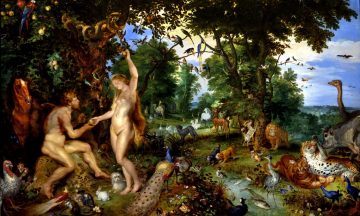Colin Burrow at The Guardian:
 The gospels (which show knowledge of the fall of the Jerusalem Temple in AD70) were written at least two decades after Paul’s epistles. And the Gospel of John was possibly written as late as the second century. It presents a Jesus who talks a great deal about his own status as God’s son. This more likely reflects the beliefs of a later era than that of Jesus himself, and John’s gospel may indeed be a biography of Christ written to suit the interests and beliefs of John’s own particular branch of Christianity. The episode of the woman taken in adultery – “He that is without sin among you, let him first cast a stone at her” – which appears only in this gospel, is not found in the earliest manuscripts, and is likely to be an even later addition.
The gospels (which show knowledge of the fall of the Jerusalem Temple in AD70) were written at least two decades after Paul’s epistles. And the Gospel of John was possibly written as late as the second century. It presents a Jesus who talks a great deal about his own status as God’s son. This more likely reflects the beliefs of a later era than that of Jesus himself, and John’s gospel may indeed be a biography of Christ written to suit the interests and beliefs of John’s own particular branch of Christianity. The episode of the woman taken in adultery – “He that is without sin among you, let him first cast a stone at her” – which appears only in this gospel, is not found in the earliest manuscripts, and is likely to be an even later addition.
Does this mean that Barton’s history of the Bible provides an armoury of arguments for religious sceptics? Well, the sceptical will certainly find material here to deploy. But Barton – who is an Anglican with Lutheran leanings – believes that it’s perfectly possible to see the Bible as a book with its own history and also to regard it as a repository of religious truths.
more here.
